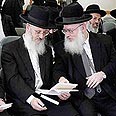
Who makes the decisions?
Jewish law issues decided by Orthodox authorities; religious Zionists fall into line
By the hand of fate two events relating to two types of religious courts, conversion courts and the rabbinical courts, occurred on the same day. In the former case there was a call to rebuild the conversion court because it failed to meet the goal of converting a significant number of immigrants from the former Russian states; in the latter case, harsh criticism was leveled at the appointment of several of the rabbinical judges, based on their conservative approach towards the painful issue of "agunot" (women whose husbands have disappeared without giving them a divorce), and "mesuravot" (women whose husbands refuse to give them a Jewish bill of divorce.)
The criticism leveled at the appointment of Orthodox rabbinical judges in the rabbinical courts was joined by an impressive coalition comprising radical secular-liberals as well as members of the religious Zionist movement.
Judging by the criticism leveled by the religious Zionist movement, it appears that the Orthodox rabbinical judges are conservative and have a total lack of understanding of real life, as opposed to the preferred alternative - judges from the religious Zionist movement.
Is this so? Let's examine what goes on at the conversion courts, which are clearly ruled by judges from the religious Zionist movement. Even where rabbinical judges from the religious Zionist movement rule, they are harshly criticized for their conservative approach, which undermines the challenge of handling conversion. With this in mind let's ask simply, would the issue of "agunot" and "mesuravot get" be resolved with the appointment of rabbinical judges from the religious Zionist movement?
It is highly doubtful whether the matter of the judges' affinity to one denomination or another within Orthodox Judaism has any real influence on the way various challenges are dealt with. The problem lies in the religious Zionists' subordination and surrender of religious authorities to Orthodox authorities. In many incidences, the relinquishment is overt, in others it is covert – but it always exists.
This relinquishment became obvious when the conclusions of the Ne'eman Commission, relating to conversion, were submitted 10 years ago, and the Orthodox camp in its entirety awaited the Orthodox rabbinical council's utterance. From the moment they rejected the compromise, all the religious authorities fell into line, including the religious Zionists.
Old joke
The religious Zionist movement remained silent even when the dispute raged over the enlistment of yeshiva boys, which ended up as an Orthodox-secular dispute. The majority of religious Zionist authorities also came to a standstill during the controversy over the Jewish "shmita" law on the eve of the New Year in 2001, leaving Rabbi Bakshi-Doron alone in the battle.
A joke from the 1950s tells that the person who determines Jewish laws in Israel is actually Feige the madwoman from Mea Shearim. How? Well, before the Religious Kibbutz movement accepted decisions comprising halachic implications, it first found out what the rabbis from Hapoel Mizrachi thought. Before the rabbis of Hapoel Mizrachi approved it, they looked towards the Mizrachi rabbis. They, in turn, did not approve a thing before checking what Agudat Israel would have to say. The latter would then check what the zealot Rabbi Amram Blau, one of Neturei Karta's founders thought.
And who would the most zealous Orthodox person turn to? He walked around Mea Shearim when he noticed Feige the madwoman standing on the rooftop of the Toldot Aaron Yeshiva. She called out to him: "You convert! Israel hater! Reformist." Out of fear Amram Blau also took a radical stance. And that's how it transpired that Feige the madwoman determines the State's Jewish religious laws.
Those who think this joke doesn't reflect the truth should prove otherwise.
Dr Asher Cohen is a lecturer of Political Science at Bar Ilan University










